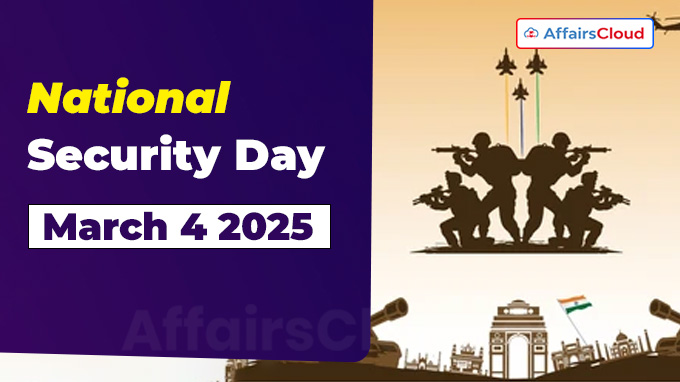 National Security Day (NSD), also known as Rashtriya Suraksha Diwas, is observed annually on 4 March across India to honor and show gratitude to the Indian Security Forces including the Police, Military, Para-Military, Guards, Commandos, and other forces who are involved in maintaining the peace and security of the people of India.
National Security Day (NSD), also known as Rashtriya Suraksha Diwas, is observed annually on 4 March across India to honor and show gratitude to the Indian Security Forces including the Police, Military, Para-Military, Guards, Commandos, and other forces who are involved in maintaining the peace and security of the people of India.
- March 4 also commemorates the formation of the Safety Council in 1966.
History of NSC:
i.The National Security Council (NSC) was established by former Prime Minister (PM) Atal Bihari Vajpayee on November 19, 1998.
ii.The NSC is a federal institutional and consultative body, with the PM serving as its Chairman and the National Security Advisor (NSA) as its Secretary.
- Brajesh Mishra was the first NSA, serving from 1998 to 2004.
iii.The NSC is a three-tiered organization within the executive office of the PM, addressing a broad range of issues, including politics, economics, energy, and security.
- Strategic Policy Group (SPG): This group forms the core of the decision-making apparatus, chaired by the NSA.
- National Security Advisory Board (NSAB): Established by Brajesh Mishra, the NSAB consists of eminent national security experts, including former officials, academics, and distinguished members of civil society.
- Joint Intelligence Committee (JIC): The JIC analyzes intelligence data from various agencies, including the Intelligence Bureau and Research and Analysis Wing, to provide comprehensive assessments of domestic and foreign intelligence.
iv.Before the formation of the NSC, national security functions were overseen by the Principal Secretary (PS) to the PM, who coordinated various aspects of national security policy and strategy.
Note: The first National Security Day (NSD) was observed in 1972.
Key Functions of NSC:
i.Comprehensive Security Oversight: The NSC oversees internal and external security, defence strategies, counter-terrorism efforts, cyber security, and the protection of critical information infrastructure.
ii.Cyber Security Initiatives: The NSC has been instrumental in formulating the National Cyber Security Strategy, aiming to protect the nation’s cyberspace and critical infrastructure from various threats.
iii.Maritime Security Cooperation: In collaboration with international partners, the NSC has expanded maritime security measures, enhancing regional stability and addressing concerns about strategic maritime routes.
iv.Technological Advancements: Facilitated discussions to bolster technological cooperation in defence, including advancements in Artificial Intelligence (AI) and space technology, to strengthen national security capabilities.
About the National Security Council (NSC):
National Security Advisor (NSA)– Ajit Doval
Headquarters- New Delhi, Delhi
Established– 1998




